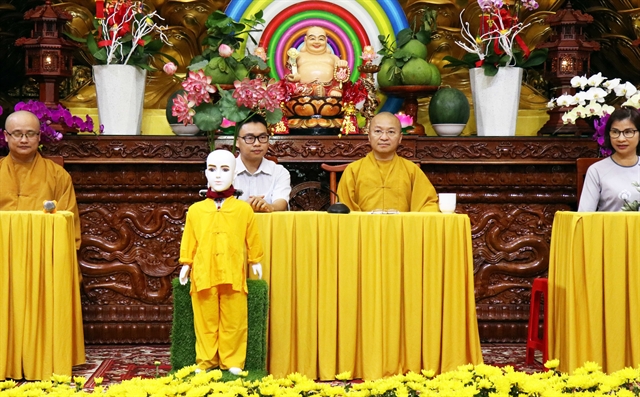 Society
Society


|
| The robot, named Enlightened Novice 4.0, was introduced at the Giác Ngộ Pagoda in HCM City, which employed AI and latest robotic technology to help spread Buddhist wisdom through its capacity to chant 100 sutras and answer some 3,000 questions about Buddhism. — VNA/VNS Photo Xuân Khu |
HÀ NAM — The impact of the Fourth Industrial Revolution (Industry 4.0) on Buddhism was discussed yesterday as part of the ongoing 16th UN Day of Vesak 2019 in Hà Nam Province.
International and Vietnamese scholars and Buddhist dignitaries shared ideas on how Buddhism has adapted to Industry 4.0 and utilised digitalisation to preserve Buddhist values and promote the religion.
Simerjit Kaur, a lecturer from the Department of Buddhist Studies, Kalindi College, University of Delhi, India highlighted the drastic changes Industry 4.0 has brought in all aspects of life.
He noted the scope and scale of benefits that people have gained from the Fourth Industrial Revolution while pointing out social challenges, such as growth of cities, slums, frustration, fear of security and emotional discrimination.
“The result of this impact is more or less marked as an atmosphere of unrest, inequality, unhappiness, stressful life, violence, conflict, mistrust etc. all over the world,” he said, adding in such a scenario, the principles and values in Buddhism could help.
“As we know Buddhism, with its ethical norms and values, deals mainly with existential problems of human being and strives to establish the regime of happiness and peace in the world. Applying Buddhist approach helps resolve the human-created problems along with the Fourth Industrial Revolution,” said Simerjit Kaur.
William Beaumont Edwards from Vipassana Buddhist Church, Centre for Buddhist Development, US, also acknowledged the massive shift in human civilisation in Industry 4.0.
He expressed his belief on how well-prepared Buddhism is to accept Industry 4.0’s civilisation changing dynamics.
“I think we can all agree that the resiliency of Buddhism, unlike many of the world religious traditions, has had the ability to obligingly adapt and easily survive any change in those dynamics with which it is presented.”
Meanwhile, Alex Amies from Google talked about how the Fourth Industrial Revolution’s achievements should be used for serving Buddhist communities, such as software and web applications to help broaden access to Buddhist resources.
He said he hopes evolving technologies can bring more improvements to Buddhist resources, including large-scale translations of Buddhist texts.
Mindful leadership for world peace
Also yesterday, the scholars, delegates and Buddhist dignitaries discussed different approaches to mindful political leadership to strengthen peace under a Buddhist perspective.
During a seminar participants shared their knowledge and international studies on how to train and master mindful leadership for world peace and happiness.
Professor Biman Chandra Barua from the Department of Pāli and Buddhist Studies at the Bangladeshi University of Dhaka said Buddhism was considered one of the major religions in the universe. It is not only a religion but also provides guidelines for people to lead a decent and peaceful way of life.
He attached significance to good governance in every state, region and country in order to bring happiness and peace, particularly amidst contemporary social injustice, wars and conflicts.
“Transparency, equity, equality, rules and regulations need to be exercised in every aspect of life for ensuring good governance,” he said.
According to the professor, political leaders who exercised the ten royal virtues of Buddhism could deliver peaceful and happy governance, thus making a prosperous, happy and healthy society.
“Mutual respect, relationships, accountability and transparency can be achieved through practicing the ten Buddhist royal virtues. These virtues bring happiness, peace and spiritual development which are essential for a nation,” he said. “A country or state could not be corrupted or unhappy if these royal ten virtues are practiced and applied in every sector of life guided by Lord Buddha,” he added.
In his presentation, Can Dong Guo from the Canadian Academy of Wisdom and Enlightenment underlined the complexities of global conflicts, saying global leadership for sustainable peace was a colossal task for great minds.
“Traditional Buddhist mindfulness training such as various meditation techniques are designed to discipline the mind to concentrate and focus,” he said.
He described the Buddhist logic as a gold mine which was unearthed to serve as a critical thinking tool, providing political leaders the necessary mindset to comprehend complex problems.
Meanwhile, Benjamin Joseph Goldstein, M.A. in Religious Studies from the US Naropa University, expressed his belief that leadership informed by Buddhist principles could be applied to deliver sustainable peace.
“There is a great deal that may be learned through applying some of the insights of Buddhist teachings to the cause of promoting healthy leadership,” he underscored.
During the event, participants also heard discussions about Buddhist orientation for leadership and sustainable peace, a Buddhist approach to universal ethnics through good governance, as well as the logic and correct mindset that peacemaking leaders must acquire. VNS